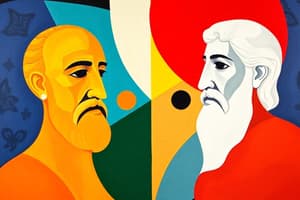Podcast
Questions and Answers
What is Plato's concept of the perfect Forms known as?
What is Plato's concept of the perfect Forms known as?
- Metaphysical Propositions
- Material Realities
- Ideal Forms (correct)
- Natural Laws
What type of government did Plato consider to be ideal?
What type of government did Plato consider to be ideal?
- Democracy
- Oligarchy
- Monarchy
- Republic ruled by Philosopher Kings (correct)
Which work of Plato illustrates the difference between Opinion and Knowledge?
Which work of Plato illustrates the difference between Opinion and Knowledge?
- Gorgias
- Critique of Pure Reason
- The Allegory of the Cave (correct)
- The Republic
Who was the father of Alexander the Great?
Who was the father of Alexander the Great?
What led to Alexander's retreat during his campaigns in Asia?
What led to Alexander's retreat during his campaigns in Asia?
What was the primary cultural impact of Alexander the Great's conquests?
What was the primary cultural impact of Alexander the Great's conquests?
Who is credited with founding the concept of the Library of Alexandria?
Who is credited with founding the concept of the Library of Alexandria?
What material was commonly used for writing scrolls in the Library of Alexandria?
What material was commonly used for writing scrolls in the Library of Alexandria?
Which philosopher is known for developing the field of geometry?
Which philosopher is known for developing the field of geometry?
What major advancement did Hippocrates introduce to medicine?
What major advancement did Hippocrates introduce to medicine?
What crucial role did the Library of Alexandria serve in the ancient world?
What crucial role did the Library of Alexandria serve in the ancient world?
Which of the following achievements is attributed to Eratosthenes?
Which of the following achievements is attributed to Eratosthenes?
What type of democracy did ancient Greece influence in modern times?
What type of democracy did ancient Greece influence in modern times?
What was one impact of the Greek invasion of Egypt?
What was one impact of the Greek invasion of Egypt?
What significant event is associated with Julius Caesar in relation to the Library of Alexandria?
What significant event is associated with Julius Caesar in relation to the Library of Alexandria?
Flashcards are hidden until you start studying
Study Notes
Plato and His Philosophy
- Plato (428-7 BCE–348-7 BCE) is a foundational figure in Western philosophy, known for the concept of Platonic idealism.
- Platonic idealism posits that perfect Forms are the true reality, with the material world merely an imitation of these ideal Forms.
- Knowledge is achieved through reason and thought, contrasting with empirical observations of the natural world.
- Plato’s vision of government centers on a republic led by philosopher-kings, prioritizing wisdom and virtue.
- The Allegory of the Cave symbolizes the struggle between opinion and knowledge, illustrating humanity's journey from ignorance to enlightenment.
Alexander the Great's Conquests
- Alexander the Great, king of Macedonia, expanded his empire by conquering Greece and the Persian Empire under Darius III.
- He undertook military campaigns across Asia Minor, Egypt, and parts of modern-day Afghanistan and Pakistan but faced a mutiny from his troops.
- Renowned for his conduct, he showed mercy to those who surrendered while being brutal to resistors.
- His legacy includes the spread of Hellenization, blending Greek culture and administration in conquered regions.
- After his death in 323 BCE, Alexander's empire fragmented into warring factions.
The Library of Alexandria
- The Library of Alexandria was a major center of knowledge in the ancient world, instrumental in translating and preserving manuscripts.
- Writing materials were limited, and books had to be laboriously hand-copied, resulting in fewer texts compared to modern standards.
- Established by Ptolemy I, the Library evolved into an esteemed institution for scholarly pursuit, connected to a temple of learning.
- Despite its destruction during various conflicts, the Library remains a symbol of lost knowledge and inspired future generations.
Scientific Achievements in Alexandria
- Alexandrian philosophers made groundbreaking advances in various fields including mathematics, astronomy, and medicine.
- Euclid is known for formulating the basis of geometry, while Archimedes invented essential tools and methods still in use today.
- Herophilos and Erasistratus pioneered human anatomy studies, applying scientific methods to their observations.
- Aristarchus proposed heliocentric theory, suggesting the Earth orbits the Sun, while Eratosthenes accurately estimated Earth's circumference.
- Ptolemy developed a significant yet flawed model of the universe, essential to astronomy despite inaccuracies.
The Legacy of Ancient Greece
- The Classical era (c. 510-323 BC) was marked by significant achievements in philosophy, politics, art, and science.
- Key philosophers Socrates, Plato, and Aristotle formed the foundation of Western philosophical thought.
- Contributions to medicine from Hippocrates emphasized empirical observation in clinical practices.
- The Parthenon symbolizes Athens' architectural achievements, and sports education was integral to early Athenian culture.
- Ancient Greece laid the groundwork for modern democracy, allowing for broader political representation and civil rights.
Rome's Rise and Influence
- Rome's fertile landscape facilitated its growth and conquests, claiming descent from Trojan origins while developed by Latins and Etruscans.
- The Palatine Hill became a central site for the emerging empire, blending cultural influences from its predecessors.
- The Roman Empire adopted religious, artistic, and architectural elements from Etruscan and Greek civilizations.
- The Roman Republic began in 509 BCE after the overthrow of Etruscan kings, establishing a representative government structure.
The Roman Republic's Structure
- The Roman political system consisted of three main bodies: Consuls, the Senate, and the Assemblies.
- Consuls held military leadership and administrative authority, while the Senate consisted of aristocratic advice-givers.
- Assemblies included patricians and plebeians, responsible for electing magistrates and enacting laws.
- The Republic's expansion benefited from military strategies, respect for conquered traditions, and economic developments.
- Transitioned to the Roman Empire under Augustus, marking a shift from republican governance to imperial rule.
Studying That Suits You
Use AI to generate personalized quizzes and flashcards to suit your learning preferences.




